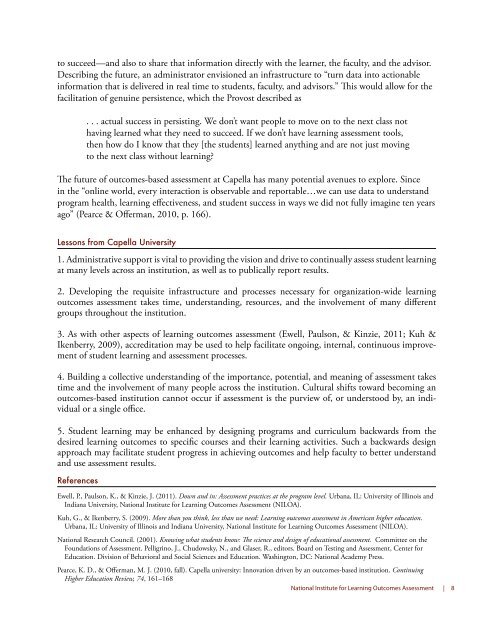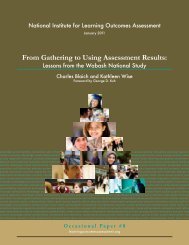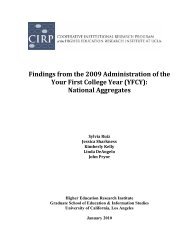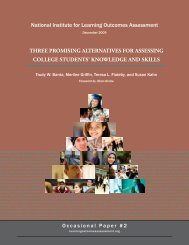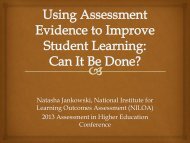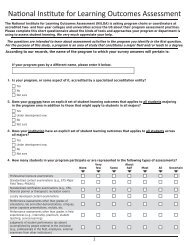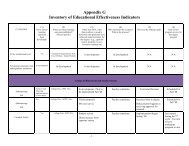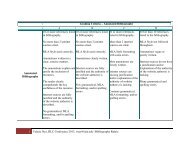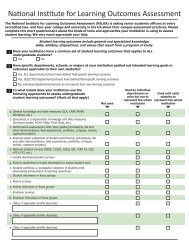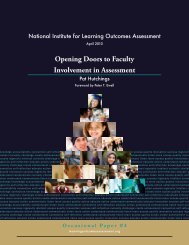Capella University - National Institute for Learning Outcomes ...
Capella University - National Institute for Learning Outcomes ...
Capella University - National Institute for Learning Outcomes ...
- No tags were found...
You also want an ePaper? Increase the reach of your titles
YUMPU automatically turns print PDFs into web optimized ePapers that Google loves.
to succeed—and also to share that in<strong>for</strong>mation directly with the learner, the faculty, and the advisor.Describing the future, an administrator envisioned an infrastructure to “turn data into actionablein<strong>for</strong>mation that is delivered in real time to students, faculty, and advisors.” This would allow <strong>for</strong> thefacilitation of genuine persistence, which the Provost described as. . . actual success in persisting. We don’t want people to move on to the next class nothaving learned what they need to succeed. If we don’t have learning assessment tools,then how do I know that they [the students] learned anything and are not just movingto the next class without learning?The future of outcomes-based assessment at <strong>Capella</strong> has many potential avenues to explore. Sincein the “online world, every interaction is observable and reportable…we can use data to understandprogram health, learning effectiveness, and student success in ways we did not fully imagine ten yearsago” (Pearce & Offerman, 2010, p. 166).Lessons from <strong>Capella</strong> <strong>University</strong>1. Administrative support is vital to providing the vision and drive to continually assess student learningat many levels across an institution, as well as to publically report results.2. Developing the requisite infrastructure and processes necessary <strong>for</strong> organization-wide learningoutcomes assessment takes time, understanding, resources, and the involvement of many differentgroups throughout the institution.3. As with other aspects of learning outcomes assessment (Ewell, Paulson, & Kinzie, 2011; Kuh &Ikenberry, 2009), accreditation may be used to help facilitate ongoing, internal, continuous improvementof student learning and assessment processes.4. Building a collective understanding of the importance, potential, and meaning of assessment takestime and the involvement of many people across the institution. Cultural shifts toward becoming anoutcomes-based institution cannot occur if assessment is the purview of, or understood by, an individualor a single office.5. Student learning may be enhanced by designing programs and curriculum backwards from thedesired learning outcomes to specific courses and their learning activities. Such a backwards designapproach may facilitate student progress in achieving outcomes and help faculty to better understandand use assessment results.ReferencesEwell, P., Paulson, K., & Kinzie, J. (2011). Down and in: Assessment practices at the program level. Urbana, IL: <strong>University</strong> of Illinois andIndiana <strong>University</strong>, <strong>National</strong> <strong>Institute</strong> <strong>for</strong> <strong>Learning</strong> <strong>Outcomes</strong> Assessment (NILOA).Kuh, G., & Ikenberry, S. (2009). More than you think, less than we need: <strong>Learning</strong> outcomes assessment in American higher education.Urbana, IL: <strong>University</strong> of Illinois and Indiana <strong>University</strong>, <strong>National</strong> <strong>Institute</strong> <strong>for</strong> <strong>Learning</strong> <strong>Outcomes</strong> Assessment (NILOA).<strong>National</strong> Research Council. (2001). Knowing what students know: The science and design of educational assessment. Committee on theFoundations of Assessment. Pelligrino, J., Chudowsky, N., and Glaser, R., editors. Board on Testing and Assessment, Center <strong>for</strong>Education. Division of Behavioral and Social Sciences and Education. Washington, DC: <strong>National</strong> Academy Press.Pearce, K. D., & Offerman, M. J. (2010, fall). <strong>Capella</strong> university: Innovation driven by an outcomes-based institution. ContinuingHigher Education Review, 74, 161–168<strong>National</strong> <strong>Institute</strong> <strong>for</strong> <strong>Learning</strong> <strong>Outcomes</strong> Assessment | 8


